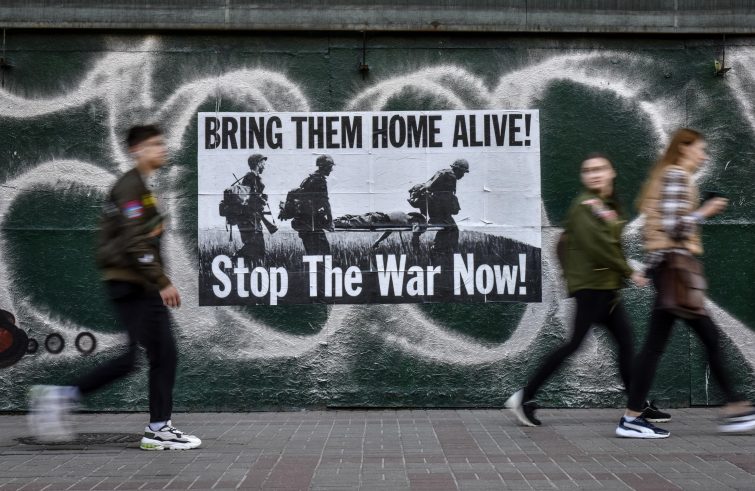
Tension is high and the situation is escalating – albeit in check for now. The director of the NATO Defence College Foundation, Alessandro Politi, one of Italy’s leading experts on geopolitics, explains and analyses the relevance of the latest events: the historic US-led summit at the Ramstein air base in Germany, where the defence ministers of 43 countries agreed to send more weapons to Ukraine; Russian Foreign Minister Serghei Lavrov’s remarks on a nuclear threat; and Moscow’s cutting off natural gas supply to Poland and Bulgaria.
The eyes of the world are on Europe’s eastern borders, but the spotlight should be on the Pacific, where China and the United States can ill afford missteps.
“It’s the ‘powder keg’ of a new world war”, warns Politi.
What will be the impact of the meeting at the Ramstein US base?
Yesterday’s summit was designed to coordinate a number of countries, both NATO and non-NATO partners, such as Kenya, with a view to meeting Ukraine’s demands for heavy weapons. It envisages monthly meetings and the creation of a standing “contact group” overseeing decisions on supplies to Kyiv.
The underlying logic is more logistical than political.
Doesn’t sending heavy weapons further delay an end to the war?
The war may last longer than expected not only because of these decisions. The first challenge is the Russian and Ukrainian negotiating stances. It only takes one person to wage war, but it takes two to make peace. The delivery of more weapons – for all we know – should enable Ukraine to resist the Russian offensive in the Donbas, which doesn’t mean equipping the Ukrainian army with weapons sufficient to engage in an overwhelming counter-offensive. Obviously, the Russians are not comfortable with this. They already said that the weapons systems risk being destroyed if they crossed the border. This is a harsh and concrete response, which confirms the tension of an ongoing war.
The escalation has begun, but for now it is largely in check – also from the perspective of the US.
Is the nuclear threat a reality?
In an interview with Russia’s state Channel One television on Thursday, Foreign Minister Serghei Lavrov said Russia would not use nuclear weapons in Ukraine, but he also warned against escalation. His statements are ominous and I am concerned. He claims that all the rules, including unwritten rules from the time of the Cold War, have fallen into oblivion.
This is very worrying because nuclear crisis management requires shared, respected and transparent rules.
Does it mean that there is no guarantee whatsoever?
Lavrov suggests that the nuclear deterrence management system, which had very clear written and unwritten rules in the past, has now become very uncertain. This is extremely worrying.
While the focus is on Ukraine, you are urging to turn our attention to the Pacific region – where you fear a China-US conflict might erupt. Why?
It’s the ‘powder keg’ of a new world war.
Russia is not in a position to be a source of concern to the US. By contrast, China is a major economic and political player, and although its military capabilities are not as powerful, they pose a threat to the United States. This represents the real problem for world peace today. As early as 2004 I became concerned about the possibility, now the likelihood, of a war between the United States and China. It is a much more worrying scenario. They each suffer from huge fragilities. The war in Ukraine is a costly distraction for Biden, whose priority is to rebuild his internally divided country. Moreover, the mid-term elections are imminent, with a very grim outlook for Democrats .
Furthermore, we must face the question of why Putin would want to go to war with NATO. I doubt he has such interests.
He has already lost his war in Ukraine. Russia is weaker than NATO in terms of conventional weapons – unlike during the time of the Warsaw Pact.
Also yesterday, Lavrov met with UN Secretary General Antonio Guterres, although talks were inconclusive.
No other outcome would have been realistic. Foreign policy does not work miracles. Guterres continued to explore possibilities. At least Guterres came back with clearer ideas about the negotiating challenges and about the context of relations with the United States.
In the meantime, Russia has cut off natural gas supplies to Poland and Bulgaria.
This was an anticipated response. Although one can argue as to whether it is legal, the supplier demanded payment in roubles, and the customer said no. This is no good news for Sofia and Warsaw, but we knew this would happen.
Should we expect more natural gas cuts?
Not necessarily. Interestingly, natural gas is still being supplied to Ukraine.
The Russians have a vested interest – especially in war – in cashing in on the sale of their gas.
The conflict is expanding, are the Russians heading into Moldova?
Not realistically. Transnistria is de facto protected by Moscow, and the Russian Federation has no interest in attacking it. There is no clear responsibility for the recent blasts. It is necessary to determine who detonated them and why. The tension is already there, there is a war.









